






It has been another full and exciting year for widening participation at King’s College London. The Widening Participation Department has supported nearly 10,000 learners and a range of dynamic and thoughtful initiatives are underway across the university. Our yearbook seeks to give a wide range of stakeholders insight into our widening participation work. It is a joy to hear from the young people, parents, carers, teachers and students who have participated in the schemes on offer. I would like to take this opportunity to thank those who have contributed to these activities and encourage anyone thinking about becoming involved to do so.
Anne-Marie Canning, Director of Widening ParticipationIt has never been more important for King’s College London to fulfil its responsibility for excellence in education by preparing young people and mature learners for life. Ensuring our student body reflects the composition of society as a whole enables students from a variety of backgrounds to obtain the life advantages that come from attending an institution like King’s. We have an ongoing commitment to excel in widening participation in the fullest sense.
The President & Principal, Professor Edward Byrne AC

Increase the number of applications to King’s College London from under-represented groups
Aim 1A
78 Students on K+/RO/ST started courses at King’s in 2016
73.9 % K+ students
Aim 1B
Students from low-participation neighbourhoods
44% Sutton Trust Summer School students
Increase the number of applicants to research-intensive universities (RIUs)
110 K+/RO/ST students offered places at Russell Group universities
Equip individuals from under-represented groups with the skills to transition to higher education (HE)
Aim 2
353
Year 12 students given access to and support in using King’s libraries
Student attendance at two of our events
Of K+ students
5.7 % are young carers
4.3% declared a disability
128 Students gained a place at their firm choice institution
52 our ‘welcome to university’ event
75 our ‘preparing for university’ event
Equip advisors and influencers* with the information and tools to support learners from under-represented backgrounds into higher education
26 teachers attended our second Sutton Trust STEM Teacher Summer School
100 % would recommend it to colleagues
132 attendees at the Brilliant Club Conference Teacher Advocates supported
27 2015–16
Aim
3
68 2016–17
Provide learners with the information to make well-informed and aspirational decisions about their progression to higher education
1,279 pupils attended workshops delivered in partnership with the Brilliant Club on topics such as ‘Making good choices’
11,613 potential students and advisors who attended information sessions in schools and colleges
90 % K+ students’ knowledge of HE increased six months into the programme
Encourage support for widening participation activity across all departments in King’s College London
Aim
4
King’s CollegeLondon d e p stnemtra
Widening participation and outreach activity
18 Widening Participation Grants successfully awarded
38 Staff registered to become part of the School Governor Network
Aim 5
King’s College London will seek out and nurture talent to ensure that our pursuit of academic excellence is enriched by the diverse experiences of our students. Students from under-represented backgrounds will be supported to gain access to higher education through high quality, innovative and effective widening participation schemes.

King’s College London has a five-stage full lifecycle approach to widening participation that addresses the needs of non-traditional students throughout their journey into university, their time on-course and their outcomes after graduation.
1
We will deliver aspiration-raising activities for local students that encourage higher education participation. King’s College London’s outreach programmes will support informed choice making through impartial guidance.
We will deliver tailored support to improve the employability and career outcomes of students from widening participation backgrounds.

We will provide excellent student and education support services that seek to address the on-course needs of students from widening participation backgrounds.
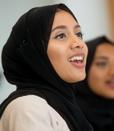
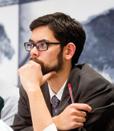
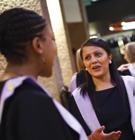
We will deliver targeted outreach work with students in London and beyond to improve access to King’s and other universities. Activities will seek to enhance attainment and preparedness for higher study.
We will ensure that King’s recruitment, selection and admissions processes are fair, transparent and identify the talent and potential of students from all backgrounds.
Founded in July 2015, the King’s Scholars programme works with Year 7-9 pupils from 13 local schools in Lambeth, Southwark and Westminster. Our first cohort of 284 pupils have just completed their first year of the scheme.
The programme aims to encourage pupils from traditionally under-represented backgrounds to apply to, and succeed at, top universities. Accordingly, much of the scheme is focused on raising the attainment of these pupils, providing information, guidance and reassurance on how to progress to higher education, and engaging parents in pupils’ education.
The programme is split into three years. Year 7 provides an introduction to university. A Campus Activity day is followed by a six-week course of in-school study skills sessions, delivered by King’s students. The year then concludes with our King’s Scholars Family Day, which welcomes King’s Scholars and their families to our Strand Campus for a day of pupil subject workshops and parental training sessions.
Year 8 offers pupils the opportunity to explore and enjoy a vast array of subjects. Through our Design a University day in October, the Subject Love Letter competition in January, our Spring Up three-day subject exploration school in May, followed by the completion of an Independent Learning Project, King’s scholars will have the chance to immerse themselves in new, exciting and engaging university subjects. Simultaneously, they will be equipped with our recently developed
‘Notre Dame School has been so impressed with the opportunities 24 of our Year 7 students have had over the last year since joining the King’s Scholars scheme.
The students have been inspired by being part of the project, they have been exposed to opportunities they would not have received in school and the students look forward to working with King’s next year (as do the staff!).’
 Teresa Crowley, Careers Coordinator, Notre Dame
Teresa Crowley, Careers Coordinator, Notre Dame
‘King’s Scholar’ skills, a set of metacognitive skills which are proven to raise attainment. Lastly, Year 9 offers careers and qualification guidance, alongside sessions that will prepare pupils for GCSEs.

From February 2017, our new website, gameplan.ac.uk, will compliment this pre-16 work. Using online games, avatars, leaderboards, videos, competitions, animations, cartoons and a host of other exciting methods, this site will provide 10–14-year-olds and their parents from across the UK with guidance on how to progress to university.

185 pupils and parents attended our first King’s Scholars Family Day, which welcomes King’s Scholars and their families to our Strand Campus for a day of pupil subject workshops and parental training sessions.
King’s Scholar and Year 7 pupil Davell Ampah and his grandmother Candice Ampah
Candice
‘I was so excited when Davell was selected to take part in the King’s Scholars scheme, having heard of its excellent reputation. However, as I didn’t go to university, I also felt some apprehension because I was unsure of what role I could play in his development. My mind was soon put at rest when I attended the Family Day.
The whole day was extremely informative but the Parental Advice session delivered by parental training expert Dr Kathy Weston was particularly invaluable in terms of giving me practical tips on how best to support Davell. I came away with a much better understanding of the choices and challenges he faces in secondary education, and a new-found confidence in how I could be a positive influence for him. Overall, I have found taking part in the scheme incredibly
worthwhile and rewarding for both myself and Davell, and the opportunity has given me a desire to become more actively involved in my grandson’s education.’
Davell

‘I have thoroughly enjoyed my experience on the King’s Scholars scheme. Not only did I have a fantastic day at King’s in November, but I also enjoyed a book club at my school with King’s students where we read a book called Holes. I loved reading this book and would recommend it for other children to read.
I also took part in King’s Scholars Family Day where I learned about World War I in King’s archives, while medicine students also taught me how to stitch wounds! Overall, I would rate my whole experience five stars as the programme has made me think more about university and my future career.’
We delivered six-week study skills programmes in 13 schools in central London to 284 Year 7 pupils
Here are some responses from attendee parents and pupils.
PARENTS
86 % would alter their parenting as a result of the training
100 % would recommend the training to other parents and also felt comfortable in a university environment
PUPILS 84% have improved their study skills through the King’s Scholars programme
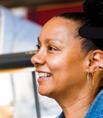
82 % use the skills learned on the programme in school
73% of King’s Scholars knew more about university study, while 90% now knew what a student union was after their first visit to King’s 95% would recommend the day to a friend and the same percentage said that they could see themselves attending university
934 applications to K+ for the 2015–17 cohort 8 A*s/A grades at GCSE, the average for K+ students
152 schools participated across London 38 K+ students enrolled in 2016
Over the past five years, K+ has equipped over 1,500 students from under-represented groups with the knowledge, confidence and skills to transition successfully to university. There are currently 109 K+ students enrolled at King’s College London and a large network of K+ graduates at Russell Group universities across the UK.
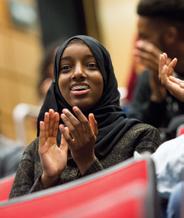
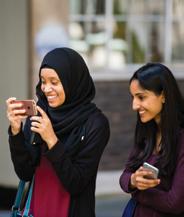
In Autumn 2016, 280 students will join the sixth cohort of the K+ programme.
Each year, we see K+ students grow dramatically in confidence, in academic and social skills through the K+ Spotlight Summer School.
This summer K+ students received an authentic taste of studying their chosen academic subject by participating in a week of intensive small group tutorials with PhD tutors trained by our partners at the Brilliant Club.
K+ students also received essential advice in making a successful university application from admissions professionals in preparation for making their applications in the autumn.
Bhangra, Dance, Photosoc and the Bangladeshi student societies engaged students in interactive workshops demonstrating the social aspect of university. K+ students got the chance to build on new relationships from the dizzying heights of the Shard and London Eye.
One of the aims of Spotlight is to improve students’ confidence in expressing their own ideas and opinions in front of small and large groups. K+ students benefited from a networking and personal brand building masterclass from Bianca Miller, runner-up on The Apprentice, in which they perfected an ‘elevator pitch’ and worked on their social media profiles. Students also participated in public speaking workshops in which they gained the skills and confidence to present to large audiences.
The highlight of K+ Spotlight Summer School is the final ceremony when students deliver a presentation on their learning to a large audience of their peers, families and a panel of judges.
This year students presented on:
• ‘Holding the Police to Account: The Case of Stop and Search’
• ‘Symmetric Structures and Hidden Messages in Mathematics’
• ‘Could our own immune systems hold the cure to cancer?’
The K+ programme is greatly supported by the King’s academic community and members of professional services at the university. Students also benefit from leaving the classroom and visiting the diverse range of cultural organisations and large businesses on their doorstep.
Over the past four years the law firm Mayer Brown has sponsored our K+ Law stream and have engaged with students at each stage of the programme including hosting the Law Careers day.
This year, we have also partnered with Penguin Random House who have sponsored our 71 book club members, enabling them to receive a free book each month and meet the authors behind the books. K+ students have also posted their book reviews on social media. Commenting on one book, a K+ book club member wrote:
‘As a whole, the book was life-changing, it was eye-opening, it was moving and above all it was memorable.’
‘I have received an all-round understanding of how life operates at university.’
‘The most important thing I’ve gained – being able to quickly make friends and have my own opinions on new material – this is especially important for university.’
‘Gained a lot of knowledge about my topic. It was challenging which I enjoyed as it allowed me to try harder.’
K+ students post-Spotlight
‘This week, I’ve learned to rise to challenging work that I have no experience in. This was a big eye-opener for me as usually I am taught things that relate to what I know. This was great to learn as at uni and in the real working world I will face new challenges. If you could, make K+ longer!’
Paul Nguyen on the Maths & Computer Science stream commented on his experience on the K+ programme Spotlight Summer School

There are six strands to the K+ programme.
ACADEMIC
Engage in university-style teaching and gain deeper subject knowledge through an independent academic project.
CAREERS
Explore a variety of career choices and develop HE and workplace skills.
Develop skills of academic enquiry in learning environments outside of the classroom.
E-MENTORING
Regularly engage with a role model student who studies a course related to their aspirational subject.
HE SKILLS
Receive information and practical support in applying to university and succeeding on course.
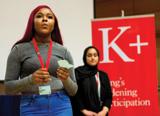


1 2 3 4 5 6
SPOTLIGHT SUMMER SCHOOL
Participate in a non-residential summer school with small group tutorials and develop their public speaking skills through group presentations.
This year the Widening Participation Department received funding from the Sutton Trust to run a STEM Teacher Summer School in collaboration with Imperial College London and the Royal Veterinary College for a second year running based on the success of the 2015 event.
The four-day residential offered teachers from across the UK a chance to explore STEM teaching at university, receive guidance and advice on applying to competitive programmes and courses and get first-hand experience of the Sutton Trust Student Summer School. Over the course of the week, teachers participated in curriculum sessions delivered by academics at all three institutions including a dissection workshop, lesson development training for science
practicals and a session to prepare teachers for the changing structures of HE and FE. Teachers were also provided with information and guidance on a range of topics including ‘Personal statement and reference writing’, ‘Admissions and what universities look for in an applicant’, how to engage with access programmes in higher education and an overview of the Sutton Trust Student Summer School process. Making use of our central location, a number of social activities were arranged including a trip on the London Eye and a formal three-course dinner. As it was a collaborative project, attendees were exposed to knowledge and experiences from three institutions at the forefront of STEM research and teaching.
Attending a residential summer school is one of the best ways secondary school students can get a first-hand experience of university life and can be essential to demystifying any misconceptions about what higher education might be like.
This year we delivered our fourth annual Sutton Trust Student Summer School for over 100 Year 12 students from across the UK. The week-long residential offered students the chance to follow academic subject streams in either Geography; English Language and Linguistics; Pharmacy or Politics, Philosophy & Law. Over the course of the week students participated in lectures, seminars and lab sessions delivered by King’s academics and PhD students.
Some academic streams also had the chance to take part in an external trip linked to their subject area, with students visiting the Supreme Court and the River Wandle.
As part of the summer school participants were also given information, advice and guidance about accessing higher education. This year we ran workshops on personal statements, student finance, resilience, motivation, social media and presentation skills. To consolidate what is learnt throughout the summer school, each academic stream is asked to deliver a presentation on an idea or subject area that they have focused on. Delivered at the end of the week to all attendees and a panel of judges, the presentations give students the chance to showcase their in-depth subject knowledge and creativity.
Some of the many highlights from this year included lab sessions on antimicrobial selection, a river field trip, seminars on sociolinguistics and a boat trip on the Thames.
2015 COHORT
66 students applied to study at King’s, representing 66% of the cohort
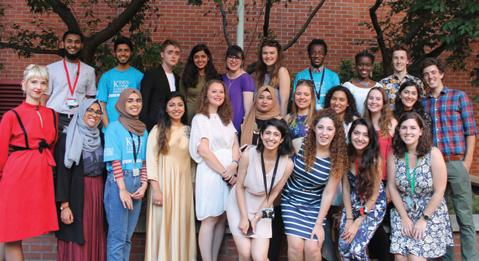
16 students enrolled at King’s in 2016
2016 COHORT
324 applications from 236 schools across the UK

107 students from 98 schools completed the week
Survey question responses before and after summer school attendance
I feel confident applying to university
I feel confident that I will succeed at university
Delivered in collaboration with three highly selective universities

% attendees agreed or strongly agreed
The Realising Opportunities programme is a national collaboration of 15 universities delivering a programme of support, information and events to Year 12 and 13 students targeted from educationally and socially disadvantaged backgrounds.
This year over 800 young people have been supported through the Realising Opportunities programme nationally, with 71 students having been recruited and supported by King’s from 12 schools across London.
There has been a strong emphasis on events for the Realising Opportunities students, with eight events being hosted at King’s across our Strand, Waterloo and Guy’s campuses since the launch event in January. Topics covered have included careers and employability, academic writing and referencing, a spotlight on student life at King’s, personal statement advice and student finance. The students also enjoyed a summer social event where they participated in a bhangra, photography or dance workshop with King’s College London Students Union and took a trip to the top of the Shard.
Mentoring continues to be an important element of Realising Opportunities and we have nine King’s College London students supporting the programme through e-mentoring.

The Realising Opportunities programme puts a strong emphasis on academia and students complete a 2,000-word academic assignment during their time on the programme. We currently have 49 students taking part, being supported by 15 King’s PhD students with topics ranging from the impacts of Brexit to the moral and social ethics of stem cell research. Our students are given access to the King’s libraries and they regularly use these as a quiet place to work, as well as to access a variety of academic material.
This summer 11 Realising Opportunities students participated on a pilot workexperience scheme and shadowed a science-based PhD tutor as they went about their research and lab work for a week. They also received interview and CV writing advice and all said that it helped them decide if a science-based course was for them.
King’s College London is part of the alternative offer scheme within the Realising Opportunities programme. Through this scheme RO universities recognise successful completion of the programme through their admissions processes. All RO universities give applications from RO student’s additional consideration and may also give an alternative offer that may be lower than the standard one normally given.
‘Realising Opportunities has given me so many tips and also tricks for university which school cannot teach us. The people on the programme are so lovely and really want to help us – which is why I always look forward to meeting them at every event. I’ve also met many new amazing friends who’ve joined me in this and we have helped each other out. I’m confident in applying for university – not just that but also settling in, making friends, doing university-style essays and taking every opportunity such as the different societies! I would recommend this programme if you are someone who isn’t really sure about what university will be like but is willing to apply to it.’
‘The Realising Opportunities programme has really been wonderful to me. The best thing for me was probably the library access because I had a quiet place to study if it was noisy at home. Also the e-mentoring scheme has allowed me to ask questions about university life and make decisions on what I want to do next year. The events are always engaging and I really do enjoy going to them. I would really like to advertise this programme to pupils that are currently at Dunraven.’
‘Spending weeks writing the academic assignment on neuroscience with my PhD tutor gave me a huge boost in confidence to pursue a career in STEM, and you feel really determined after passing the academic assignment to do more than what’s required out of normal A-levels. The team at RO are probably the most supportive people you’ll meet as they offer advice from CV writing to how you go about getting your alternative offer with RO’s partnered universities. Even when I missed my offer for the course I initially applied for, they looked at my A-level grades and offered me a second chance with a degree at King’s that suited me better than anything else I could imagine. I’ve been very lucky to be a part of the programme and you will be too.’
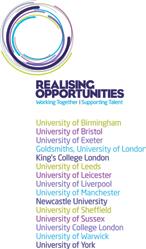
The aim of the Teacher Advocate Award is to equip new teachers to support some of the most disadvantaged pupils in London to succeed in applying to and studying at university. We achieve this through providing professional development opportunities and enabling Teacher Advocates to encourage their brightest students to join our widening participation programmes.
We are proud to support access to the teaching profession by providing bursaries for participants on the Teacher Advocate Award. The teachers we support take teaching roles in non-selective state schools around London that we wish to engage with in widening participation activities. We are pleased to have seen relationships with these schools strengthened through the work of our Teacher Advocates.
In 2016, our Teacher Advocates were invited to apply for a School Project Grant of up to £500 to deliver widening participation initiatives with under-represented students from their schools. We have been delighted to support projects to develop GCSE skills for Modern Foreign Language students at the British Film Institute and to allow a cohort of disadvantaged girls to experience Computer Science in a higher education environment using spaces, facilities and staff at King’s College London as a result of the School Project Grant initiative.
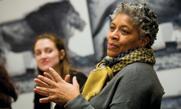
The Teacher Advocate Award is unique in being the only programme which brings together teachers from the PGCE, Schools Direct, Teach First Leadership Development

Programme and Researchers in Schools initial teacher training routes as well as participants from the Frontline Social Work Leadership Programme to develop and share good and innovative school-based practice in widening participation.
We are delighted to have seen a growing number of students from Teacher Advocate schools partaking in our widening participation programmes as a result of engaging with our Teacher Advocates over the past three years.
The year 2016 will also see the Teacher Advocate Award expand to welcome 23 participants from the Frontline Social Work Leadership Programme. We are excited to provide training and support to Frontline participants to ensure that best practice in supporting young people into higher education is demonstrated by important influencers of under-represented students away from school.
Our Teacher Advocates and Frontline participants will have the opportunity to act as key stakeholders to communicate across their professions and share their experiences. The Teacher Advocate Award will be achieved by participants attending training, carrying out engagement activities in their schools, reflecting on their learning and sharing good practice.
The training calendar that we provide as part of the Teacher Advocate Award raises awareness of some of the challenges faced by the most under-represented groups within higher education and gives a first-hand insight into how to support learners to succeed in accessing higher education.
Our participants will partake in training led by higher education experts including the Director of Admissions at King’s College London. The content will include ‘Admissions and UCAS’, ‘Informed qualification choices’, ‘Supporting under-represented groups’ and ‘Professional development in early years teaching’.

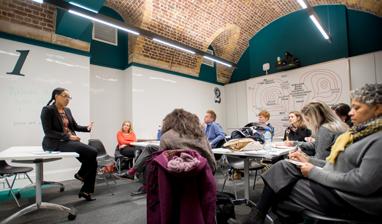
Participants will also be trained in how to effectively utilise the recent Advancing Access online teacher resource and will be invited to a number of additional training events led by our partner institutions throughout the year. We are committed to ensuring that our Teacher Advocates are in a fully informed position to prepare and support disadvantaged young people into higher education and beyond.
We are proud to state that 100% of our 2015–16 Teacher Advocate Award cohort would recommend the programme to their colleagues or prospective teachers.
King’s PGCE and Schools Direct
RECRUITMENT
21 core Teacher Advocates (11 PGCE, Schools Direct, Teach First and 10 STEM Summer School participants)
16 Researchers in Schools
31 Frontline
26 teachers attended the 2016 STEM Summer School
100 % would recommend the scheme to a colleague
2015 COHORT 14 meetings with careexperienced students
7 students helped with their application via email
Nationally, looked-after children do not achieve the same success at school as their peers. The latest statistics reveal that only 13% of looked-after children achieved five A*–C GCSEs including English and mathematics compared with 58% of their peers.
This inequality is further exacerbated at higher education where only 6% of care leavers entered higher education compared with 38% of non-care experienced students in 2013–14 (Department of Education).
King’s College London is committed to supporting students from a care background throughout the student lifecycle and this provision has been used as an example of best practice by the Department of Education and Buttle UK.
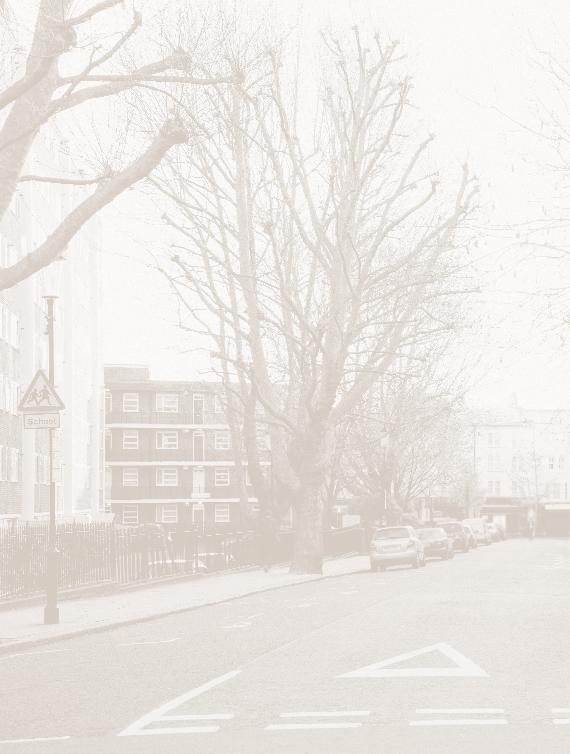
This year we have worked closely with the Fostering Network and have hosted events for designated teachers for looked-after children within schools and their foster parents to raise awareness of the support available with regards to outreach activity as well as support once they are at university.
We have embedded a new verification process for care-experienced students applying to King’s College London. This enables us to apply a contextual admissions process as well as tailor our support accordingly and extend our offer of support to local authorities and virtual schools.
2016 COHORT 82 verified care leavers (11 in 2014 cohort and 19 in 2015)
Our pre-university support for careexperienced students includes: bespoke introductory days for care leavers and training for local authority staff, individual personal statement e-mentoring and the opportunity for students to meet with a member of the WP team to discuss their university application and any queries they may have. Once students enrol at King’s they receive the option of 52-week accommodation as well as bursary assistance and are invited to attend an induction event and meet with an undergraduate buddy who will welcome them and be a ‘friendly face’ at the university. In order to achieve a holistic support programme the university works closely with many external stakeholders, including UNITE and offers five scholarships per year for care leavers to cover the cost of their accommodation and a £4,000 stipend per year. We have also been on the steering and research group for Stand Alone, a registered charity that supports students estranged from their families. In addition, we fully understand that the difficulties these students face may continue once they graduate so we collaborate closely with Drive Forward in offering paid internships and other career opportunities for care-experienced students.
At King’s College London we define a mature learner as any person beginning their first undergraduate degree at the age of 21 or over. Mature students are an important target group for the department and we value and recognise the skills and experience they bring to the university.
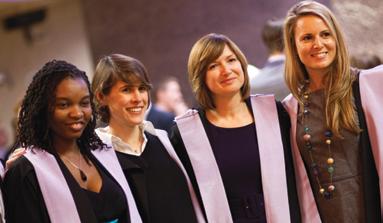
The last year has seen an increase in our level of activity with mature students. We are holding various information days for mature students at further education colleges in the autumn term. These sessions will advise mature students on their applications and raise awareness of the support available.
In order to help prospective mature students better understand what it might be like to return to education we created a video which showcased the experiences of four mature students currently studying at King’s. The video provided an insight into the concerns these students faced when considering a return to education and the positive experiences they enjoyed when they arrived. We also produced a printed guide for mature students to help answer questions they might have and alleviate some of their worries concerning their return to education.
This year has also seen an enhancement in the level of support provided to mature students in their first weeks of arriving at
King’s. Together with Student Support Services we held a mature students meet up and were delighted to welcome over 80 attendees who were studying various courses across the different campuses. We also understand the challenges that student parents can face so held an afternoon tea for anyone with caring responsibilities and met with 20 attendees who were able to share their experiences of studying with children.
Over the next year we are looking forward to developing our relationships with Further Education (FE) colleges and we will be running more information sessions for prospective mature learners in the autumn term.
‘ Returning to education has taken me away from a job where I was feeling quite trapped and now I’m feeling quite young again, quite excited about life and I feel options are open to me.’
‘On returning to education I felt really nervous. I thought that because I was a little bit older, had different experiences to everyone else, I might not fit in. However, when I got to university, that all went away. I got chatting to people when we were coming to register for our courses and that really settled my nerves.’

As part of our commitment to full lifecycle widening participation, in summer 2015 we commenced a groundbreaking pilot project in partnership with the Behavioural Insights Team (BIT).
Originally based in the Cabinet Office, the Behavioural Insights Team evaluate whether carefully designed interventions, inspired by the behavioural sciences, can effect changes in human behaviour which benefit those individuals concerned. These interventions (or ‘nudges’) are tested using Randomised Control Trials (RCTs) to establish their effectiveness prior to them being scaled up and applied to whole populations.
Working with numerous departments and services, our pilot project aims to establish whether nudges can successfully be implemented in a university environment to improve the experience and outcomes of widening participation students enrolled in undergraduate study.
To enable us to target our nudges most effectively, the pilot commenced with a series of student journey workshops. These gave a group of current undergraduate students, from all years of study, the opportunity to map their King’s experience to date, share their key academic, financial, social and emotional experiences and discuss their interactions with key university services. Using this data, we built an understanding of the key barriers and opportunities students experience and
designed three nudges aimed at first years. The nudges were delivered via text messages and email. The first focused on the core milestone of January exams, encouraging students to plan their study and travel in good time. The second intervention, King’s Community Ambassadors, sought to provide peer support: second- and third-year students called first-years to provide friendly guidance and support. The final nudge encouraged students to engage with opportunities to study abroad, an experience linked to improved graduate employment outcomes.
We are still gathering the data to measure the success of these interventions but, following a period of evaluation with students, planning for the second pilot year is under way. Proposed nudges include a suite of text messages designed to show students how to best use their first term to build a strong foundation for their time at King’s, expansion of the Community Ambassadors trial and an intervention encouraging students to progress to postgraduate study at King’s.
The Widening Participation Department and Study Abroad Office are committed to ensuring that study abroad remains accessible to all students. In the last year we launched the Broadening Horizons Award, offering funding to WP students for year- or semester-long opportunities as well as short-term summer programmes or similar opportunities.
In addition to the Broadening Horizons Award, students were also given the opportunity to participate in the Global Leader Experience programme in Kuala Lumpur, Malaysia. This was a four-day programme where students participated in leadership activities and cultural visits. Twenty-five places were funded for King’s
Living Bursary students to attend and half of those who took part were Widening Participation programme alumni. One of the participants, Amy Rogerson, shares her experience:

What did you do during your time in Kuala Lumpur?
We spent the first couple of days exploring the university campus and the city of Kuala Lumpur. On Monday we were briefed on the Global Leader Experience programme and had the opportunity to meet students from other universities. On Tuesday, Wednesday and Thursday we visited various companies in the technology industry. There were a number of speakers presenting their individual companies, highlighting the ways in which they are attempting to build a ‘Smart City’. We were then split into groups and tasked with coming up with our own ideas on how we would contribute to the advancement of this sector and our ideas were presented to the speakers and the other groups.
What were the highlights of your trip?
Having the opportunity to meet other students from their respective institutions was particularly enjoyable. We were able to discuss ideas from all angles and I made
some interesting and valuable contacts. Also, experiencing the culture first-hand was enlightening and was a once-in-a-lifetime experience.
How have you benefited from the programme?
This programme has greatly developed my communication, leadership and management skills, to the point where I have a new-found confidence to take on projects and have the ability to give presentations and critically appraise ideas. Undertaking this programme in Kuala Lumpur meant that I had the ability to travel and experience new people and cultures; this in itself has been invaluable.
‘I thoroughly enjoyed the experience and it was probably one of the best things I’ve done. I loved meeting new people and learning about the challenge. Being given the opportunity to travel was amazing.’
‘I enjoyed being able to explore KL the most, making new friends from different universities and immersing myself in situations that I wouldn’t usually have the opportunity to experience, for example, studying abroad.’
Quotes from participants
Achievements
25 funded places available
12 WP alumni participated
100 % students would recommend the global experience
The focus on white working-class boys’ access to higher education has been growing in recent years. The Prime Minister, Theresa May, made reference to this in her first speech in Downing Street saying ‘If you’re a white, working-class boy, you’re less likely than anybody else in Britain to go to university.’ The Widening Participation Department identified this as a pressing area of under-representation and commissioned a joint report with the education and youth-development ‘think and action tank’, LKMCo.
The report sought to enable evidence-led practice through the bringing together of academics, policymakers, teachers and practitioners. A series of roundtables were held at King’s College London. Their combined insights unpick the issue of white working-class higher education participation with thoughtfulness, tact and rigour. The report argues that if they are to be successful, efforts to bring more white working-class boys into university need to begin at primary school and involve parents. The report is unique in bringing together insights on the subject from teachers, universities, academics and sector professionals.
Loic Menzies, Director of LKMCo said: ‘working with King’s College London on this project was a fantastic example of how collaboration between universities and the third sector can expand the impact of research. LKMco and King’s expertise was highly complementary and together we produced a report that speaks to a key issue for society and education at the moment and which will play an important role in shaping policy and practice in the next few years.’
The report received a great deal of press and media attention. The Widening Participation Department will work with LKMCo in the forthcoming year to explore the issues facing another under-represented group, those from gypsy and traveller communities.
Copies of ‘The underrepresentation of white working class boys in higher education: the role of widening participation’ are available for download:
www.lkmco.org/white-working-class-boyshigher-education-widening-participation
The underrepresentation of white working class boys in higher education
The role of widening participation

‘If you’re a white, working-class boy, you’re less likely than anybody else in Britain to go to university.’Sam Baars, Ellie Mulcahy and Eleanor Bernardes
‘The Sanctuary Scholarship is an integral part of King’s response to the current refugee crisis. We are proud to support talented students to study at King’s College London and fulfil their potential.’
Dr Joanna Newman, Vice Principal InternationalAs a response to the current refugee crisis King’s College London has created a support package to ensure students who are not eligible for student finance can access higher education. The Sanctuary Scholarships encompass a fee waiver and a maintenance grant.
My name is Muhammad Arkam Babar and I had been out of education for two years because I was not eligible for student finance due to my immigration status, even though I had lived in the UK as a legal resident for more than nine years. I searched for different options relentlessly as education means a great deal to me. I found nothing for two years and then came this Sanctuary Scholarship by King’s College London. I got in touch with Anne-Marie Henderson regarding this and she guided me through the whole process. I attended an event which she had organised regarding the scholarships which gave me all the information I needed to kick-start the application process. The support I received from Anne-Marie was amazing; I could see that she genuinely cared about my story, my journey. The whole concept of these scholarships was so surreal to see as people in my situation often get overlooked by universities but King’s College London proved once again why it is one of the best universities in the world by opening up this scholarship for people in my situation. This is a change towards equality for all, a concept that will give King’s an edge over other universities for equal opportunities and fairness. I will be grateful to them for what they have done for me for the rest of my life.
I just would like to finish up by saying that if it wasn’t for this scholarship I may not have been able to go to university for another three years. King’s College London has offered a lifeline for me and my family, who have suffered with me during this stressful time. To anyone reading this, my advice to you will be, dream! Dream big because everything happens for a reason and if you hold onto that dream during tough times then there is no one who can stop you from achieving it. Furthermore, our stories are our most powerful weapons and they are what make us unique, so don’t be afraid to share your story.

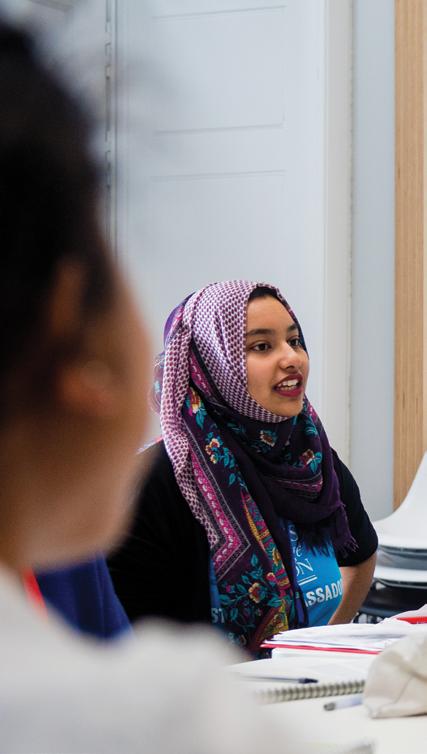

Through the Widening Participation Grants Scheme, we are providing staff at King’s with funding and support to deliver their own widening participation activity. We are funding 18 different projects in 2016–17, working with all groups from primary school pupils to student parents.
These projects, selected from applications made by staff and students across King’s, will draw on the enthusiasm and talents of King’s staff and students to support widening participation. Showcased here are just a few of these.
We aim to take 15 Year 12 science students from schools that often have a poor progression to Higher Education Institutions (HEIs) for a one-week intensive lab-based work experience on the Guys campus at King’s. Our students will be selected by our collaborating partner Kirstie Sant at Access Work Placements, a charity that works to provide real work placements for schoolchildren. Our programme will use a combination of teaching videos and direct hands-on laboratory experience of how to conduct basic cell and molecular biology. Groups of three to four students will be guided by their PhD student facilitator and perform tissue culture of cancer cells, isolate and analyse DNA, clone DNA and examine cancer tissues like a pathologist. We will also guide the students in completing a successful UCAS form and writing a good personal statement. We want to inspire, enthuse and raise the ambitions of the students and encourage them to pursue biomedical research in future. An equally important ambition is to enable King’s PhD students to develop their science communication skills, an essential skill as they come to write lay summaries on grant applications or talk to fundraisers.
The Widening Participation Grant that Outreach for Medicine has received is being used to set up and run a programme of
medically themed workshops that will be delivered in non-selective state primary schools throughout Greater London. They will expand upon the work that Outreach for Medicine currently does in secondary schools and colleges.
Our overall aim is to raise the aspirations of primary-aged pupils and to promote medicine as a career. We intend to do this by running fun and informative workshops that demonstrate the role of a doctor and highlight that science is an enjoyable and fascinating subject.

Our workshops will be based on various topics of human biology and health, including blood and the heart, diet and digestion, as well as lungs and breathing. All workshops will be led by Outreach for Medicine staff and current Extended Medical Degree Programme student ambassadors.
The Year 11 Natural & Mathematical Sciences Summer School will be a mix of interactive sessions and lectures/seminars covering the exciting research happening within our department. The summer school is open to all Year 11 girls who are passionate about science, technology, engineering and maths (STEM). The event is a soft skills course, so the students will learn key skills to use during their scientific careers. Top academics, young researchers and professionals will guide the students through a series of hands-on
experiments and challenging scientific problems. The content and resources used throughout the course will be available as a free online resource after the event.

The main aim of this collaborative project is to develop a set of educational activities that creatively engage local secondary school and Sixth Form students currently under-represented on KCL undergraduate Psychology and other health-related programmes, including Nursing and Medicine. The activities will centre around a theme of ‘health inequalities’, and will inspire students to analyse and think critically about local health data and understand different routes into health-related undergraduate courses and careers in academic research.

This project will develop a Spanish and Portuguese translation festival targeting pupils from Year 9 to Year 13. We will work with these language pupils to develop translations of theatre scenes, song lyrics and poems, which they will present at a Festival of Translation in Performance at King’s. This is the first in a series of events that will seek to bring together language learners from Key Stage 4 and 5 to create a model of mentoring
across year groups and learning stages. We will work closely with the schools involved to develop the translation process, and our facilitators will direct workshops with teachers and pupils. Our key objective is to inspire and foster the study of languages in schools.
Thinking Further offers sixth formers in London schools and academics and research students from across the Faculty of Arts & Humanities the opportunity to work together on challenging and unfamiliar material. The departments of Comparative Literature, English, European Studies, Film Studies, History, Modern Foreign Languages, and Theology and Religious Studies are all running six after-school sessions at King’s in the summer and autumn.
Each week departments post material to look at ahead of the session, and then the group gets together to talk about it. This is a chance for sixth formers to get a flavour of university work and a sense of a subject’s range, and for staff at King’s to work with talented school students. Now in its third year the project hopes to give students a wide choice and integrate a strong careers element.
‘Thank you so much. I am delighted to have been awarded it.’
Dr Helen Coulshed, Teaching Fellow in the Department of Chemistry‘This is fantastic news, King’s STARS was a tremendous success this year, and we’re all very excited to now have the opportunity to run this programme again next year!’
Maddy Parsons, Professor of Cell Biology‘K+ students give me fresh perspectives on issues and re-energise my enthusiasm for my work. Teaching makes my research better and is a lot of fun!’
Rebecca FarnumI am no stranger to higher education – three of my grandparents taught at university in America. But in my hometown, high school graduation rates were low and university attendance even lower. Widening participation has thus been a passion of mine since secondary school, when I began considering the inequality of education in America. After moving to the UK, I became involved in youth empowerment schemes at the University of East Anglia in partnership with Norfolk County Council. Moving to King’s for my PhD, working with widening participation was an obvious fit.
For the past two summers, I have served as an Academic Tutor on the K+ Spotlight Summer School, a non-residential summer camp for Year 12 students. The week engages doctoral researchers, undergraduate student ambassadors and A-level pupils in a ‘taster’ of university life, from small group tutorials

to large lectures to dance classes with the Student Union. I have worked with dozens of students to explore the topic ‘Does the Telly Lie? Media and the Middle East’. For me, teaching is a chance to see my research subject through new eyes. ‘K+ students give me fresh perspectives on issues and re-energise my enthusiasm for my work. Teaching makes my research better and is a lot of fun!’
Ideally, the role of the university is to create and share knowledge. Widening participation schemes like the K+ Spotlight Summer School are helping to do just that, and I firmly believe all academics should be engaged in community outreach as a central part of their work. I hope to see more PhD students, as well as professors, engaged in widening participation efforts in the future so that they – as well as their students –can benefit from a more diverse university community.
I am a third-year life sciences PhD student and an elected Student Officer at the KCLSU. My research is primarily in the field of cell biophysics. I study novel protein interactions that control epithelial cell migration and stability in the lungs, which is important for understanding the biology of lungs under homeostatic and inflammatory conditions. As a Postgraduate Research Officer at KCLSU, I uphold, defend and extend the rights of the 3,000+ PhD students at King’s. I have been involved with widening participation at King’s for a year and a half now.
I strongly believe that every child deserves an equal start in life, no matter where they come from. While I was still an undergraduate student myself I began tutoring those less privileged than I in India. When I moved to the UK, I wanted to continue helping pupils reach their potential. Widening participation at King’s showed me the way here, and I am always thankful to them for their support!
I have been an academic tutor on the Realising Opportunities programme and K+ Spotlight Summer School. Encouraged by the enthusiastic widening participation team, I also applied for and was granted the Widening Participation Grant this year to run my own outreach programme called Shadow a Scientist.
As we are at the forefront of cutting-edge research, activities like these help us share the mind-boggling knowledge we acquire with some of the most enthusiastic pupils, who otherwise may not have access to such information. We are, in essence, developing a culture of scientific curiosity by reaching out to these young people who are the future of our society. As is evident, widening participation activities are a great platform to hone public engagement, science communication and leadership skills while contributing meaningfully to our society. I would strongly encourage academics to get involved.
King’s has emerged as a pioneer in promoting diversity and social inclusion through its innovative widening participation projects. Our widening participation students will be torchbearers to lead the way into a fairer and more equal society.
‘We are, in essence, developing a culture of scientific curiosity by reaching out to these young people who are the future of our society.’

The activities and programmes delivered through the Widening Participation Department are made possible through the support, partnerships and collaborations of individuals, businesses and charitable organisations.

We would like to thank the following departments, organisations and individuals for their contribution towards widening participation at King’s over the last year.

Article 26
Barclays
The BE Group
Behavioural Insights Team
The Brightside Trust
British Dental Association
British Museum
Buttle UK
The Courtauld Gallery
Drive Forward
FixUp
Florence Nightingale Museum
Foreign and Commonwealth Office
International Space School Education Trust
Just For Kids Law
King’s Careers and Employability
King’s Commercialisation Institute
King’s Cultural Institute
King’s Health Partners
King’s Outreach for Medicine
Mayer Brown
National Centre for Citizenship and Law
National Maritime Museum
Penguin Random House
Royal Courts of Justice
Royal Observatory
Science Gallery London
The Shakespeare Globe Trust
Southwark Law Centre
Supreme Court
Tougher Minds
Unite Foundation
Wellcome Collection
The Widening Participation Department continues to grow as we develop new programmes and deliver our full lifecycle model. We would love to hear from anyone who is interested in finding out more about our work or getting involved.


Anne-Marie Canning
As Director of Widening Participation, Anne-Marie provides leadership and strategic direction for full lifecycle widening participation across the institution.
@amcanning
Beth Craigie
As the Widening Participation Coordinator for King’s College London Students’ Union, Beth is responsible for increasing awareness and understanding of widening participation within the student body and training, supporting and facilitating student-led outreach.


@kclsu_beth
Doreen Thompson-Addo

Doreen is responsible for the department’s work with post-16 students as well as on-course widening participation students. She also has oversight of the department’s relationship with teachers and our work with key target groups.
@doreen_kcl
Niaomi Collett
As Deputy Director, Niaomi works closely with Anne-Marie Canning to ensure the smooth running of our projects and the delivery of strategic aims. She also line manages the Widening Participation Managers.
Kirsty McLaren
Kirsty divides her time between Widening Participation and Dental Outreach. She is responsible for delivering the Sutton Trust Summer School, the Dental stream of the K+ programme and the Extended Support Dentistry Programme (ESDP).
Eleri Burnhill
Eleri divides her time between the Widening Participation and Planning and Student Analytics Departments. Her main responsibilities include analysing student and survey data to evaluate widening participation programmes at King’s and producing statutory widening participation reports.
@eleri_burnhill
Luke Chapman
Luke manages the relationship with some of our key partners, such as the Brilliant Club and IntoUniversity. He also manages the K+ book club and our visits to schools and colleges.
@luke_kcl
Eftyhia Alexandrou
Effy is the Widening Participation Coordinator for pre-16 activities. She supports the development and delivery of the King’s Scholars Programme.

@effy_kcl
Anne-Marie Henderson
Anne-Marie leads on supporting and advising students who may face challenging circumstances with the transition to university. She also manages the Realising Opportunities programme at King’s.


Tom Weaver
Tom is responsible for the Teacher Advocate Award scheme and provides support for the K+ programme. He also manages our student ambassador programme and School Governors Network.

@tom_kcl
Syreeta Allen
As K+ Officer, Syreeta is responsible for the delivery and operation of the K+ programme and supports participants through every stage of the scheme.
@syreeta_kcl
Joe Collin
As Pre-16 Widening Participation Officer, Joe is primarily responsible for the delivery of King’s Scholars. He also oversees the development of the widening participation website.
@joecollin2
Maija Koponen
As Student Lifecycle Officer, Maija is responsible for developing and implementing initiatives to support widening participation learners on course at King’s.




Zuleka Mayet
Zu is responsible for administrative support within the department, as well as acting as a central point of contact for enquiries in the Widening Participation Department.

Billy Reed
Billy oversees the department’s work with pre-16 students and is also responsible for the development, implementation and evaluation of the widening participation activity at King’s.
@kcl_billy

Designed by: Calverts
www.calverts.coop
Approved by brand@kcl.ac.uk
October 2016

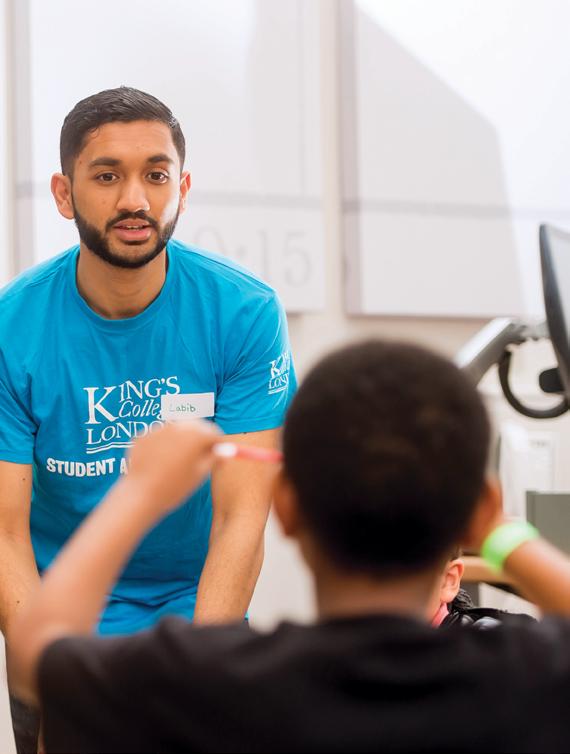
www.gameplan.ac.uk





Launched in February 2017, gameplan is a free games-based website provided by King’s College London, that allows 10–14-year-olds and their parents to explore university.
Whether it’s university study, finance, life and skills, future career options, qualification choices or even how to perform better in school, gameplan will equip you with everything you need to know.
Better yet, pupils will learn all of this through games! Design your own avatar, earn points and move up our national leaderboard as you progress through each challenge.
For parents, a wide range of information, expert advice and crucial hints and tips will be provided, empowering you to plan ahead and guide your child to university and beyond.

It’s never too early to start planning your future. So…
What’s your gameplan?
Meet university students and lecturers

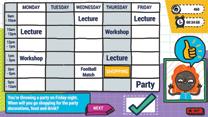

Free expert advice for parents and guardians
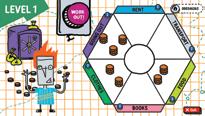





 Play games whilst exploring a wide range of subjects
Play games whilst exploring a wide range of subjects